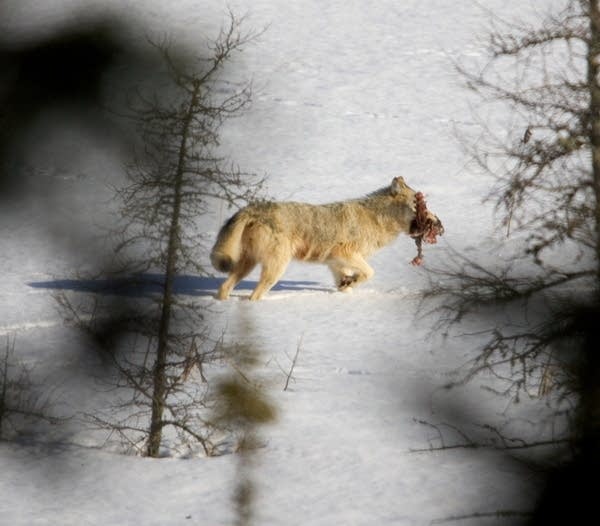Animal welfare groups sue to end Midwest wolf hunt

By STEVE KARNOWSKI
Associated Press
MINNEAPOLIS (AP) — The Humane Society of the United States and other animal welfare groups filed a lawsuit Tuesday to restore federal protections for gray wolves in the western Great Lakes region that were lifted last year.
The lawsuit, filed in federal court in the District of Columbia against the U.S. Fish and Wildlife Service and its parent agency, the U.S. Department of the Interior, said the decision to take wolves in Minnesota, Wisconsin and Michigan off the endangered list threatens the animals' recovery throughout most of their historic range. At one time, the animals roamed nearly all of North America.
The Humane Society of the United States provided a copy of the lawsuit to The Associated Press before its public announcement in the afternoon. The other plaintiffs include Born Free USA, Help Our Wolves Live and Friends of Animals and Their Environment.
Create a More Connected Minnesota
MPR News is your trusted resource for the news you need. With your support, MPR News brings accessible, courageous journalism and authentic conversation to everyone - free of paywalls and barriers. Your gift makes a difference.
Hunters and trappers in Minnesota and Wisconsin killed 530 wolves combined during those states' recently concluded seasons — 413 in Minnesota and 117 in Wisconsin. The Michigan Legislature voted in December to authorize wolf hunting, which could resume as early as this fall if the state's Natural Resources Commission approves.
"In the short time since federal protections have been removed, trophy hunters and trappers have killed hundreds of Great Lakes wolves under hostile state management programs that encourage dramatic reductions in wolf populations," Jonathan Lovvorn, chief counsel for animal protection litigation at the HSUS, said in a statement. "This decision rolls back the only line of defense for wolf populations, and paves the way for the same state-sponsored eradication policies that pushed this species to the brink of extinction in the first place."
U.S. Fish and Wildlife Service spokeswoman Georgia Parham said she couldn't comment on the lawsuit, but the agency took the wolves off the endangered list because the population had recovered and followed the law in doing so.
The Wisconsin Department of Natural Resources issued a statement saying that putting wolves back on the list would not be in the best interest of the animals or state residents.
"We intend to continue managing wolves in ways that work for Wisconsin, socially and biologically," DNR Secretary Cathy Stepp said. "But to do so, management authority needs to remain in the hands of the state. We must maintain the authority to employ tools, like a wolf hunt, when populations and depredations peak as they have this year. Increased conflicts with domestic livestock and pets benefit neither humans nor wolves."
Michigan is expected to make a decision on wolf hunting this spring. Officials say if a hunt is approved, it likely will be limited to parts of the sparsely populated Upper Peninsula where wolves have preyed on livestock and pets.
"Management of wolves by state experts is best for the Michigan wolf population and for citizens," said Ed Golder, spokesman for the Michigan DNR. "Toward that end, the state continues to implement Michigan's well-regarded wolf management plan, which went into effect after wolves last year were removed from the federal endangered species list."
A spokesman for the Minnesota DNR declined to comment until officials could review the lawsuit.
It's been more than 40 years since the federal government imposed protections to prevent wolves from going extinct in the lower 48 states. Gray wolves recovered to more than 4,000 combined in the western Great Lakes and northern Rocky Mountain states by the time the government took them off the list in those areas in January 2012. That action followed several years of court battles and turned responsibility for managing their populations back to the states.
The latest lawsuit calls the Fish and Wildlife Service's 2011 decision to take wolves off the list "biologically reckless" and contrary to the Endangered Species Act. It says "the existing regulatory mechanisms in the Great Lakes region are anything but adequate," and that allowing hunting and trapping in the western Great Lakes when wolves don't exist in 95 percent of their former range runs counter to the goals of the act.
Minnesota had an estimated 3,000 wolves before they came of the endangered list, while Wisconsin and Michigan had about 850 and 700. The three states' management plans would allow a 50 percent decline in the region's population if hunting and trapping took it down to the minimum levels allowed under their plans, the lawsuit says.
"This drastic population decline would not only threaten the Great Lakes population, but it would prevent this population from serving as a source of dispersing wolves that could repopulate unoccupied portions of the wolf's range," the lawsuit says. Environmentalists also have gone to court to try to restore federal protections to wolves in Wyoming.
Wildlife managers predicted before the inaugural seasons in Minnesota and Wisconsin that hunters would face stiff challenges in bagging the wary predators. It turned out not to be quite as difficult as expected. Minnesota and Wisconsin slightly exceeded their hunting-and-trapping targets of 400 and 116, respectively, but officials said those were just goals, not firm quotas, so exceeding them was not cause for concern.
Associated Press reporter John Flesher contributed to this story from Traverse City, Mich.
